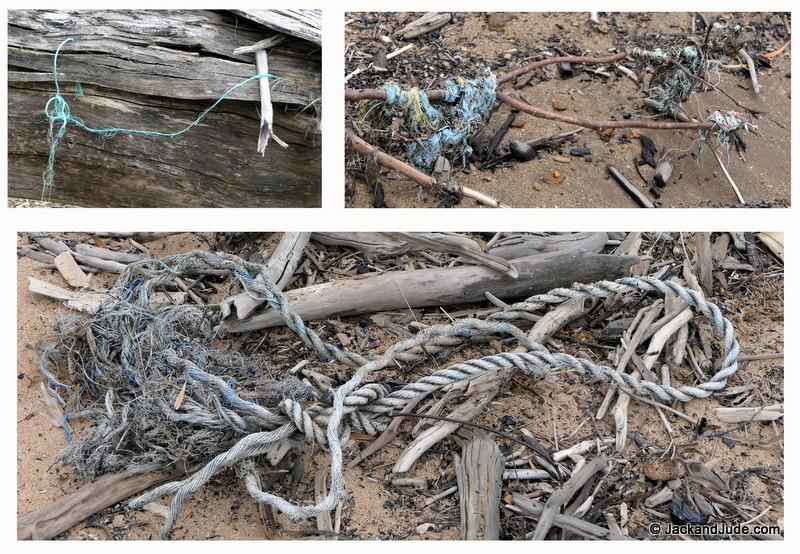
A spring-cleaning that all sailors can be proud of
by David Schmidt 12 Mar 2019 16:00 GMT
March 12, 2019

Thousands upon thousands of Fish Farm Rope Bits breaking down into Microplastic © jackandjude.com
A few weeks ago, my wife and I, and some sailing friends, spent a chilly Sunday hiking along Ebey's Landing National Historic Reserve on Whidbey Island, some 30 miles north of my home in Seattle. For anyone who isn't familiar with this five-mile loop, the trail begins in prairie-like setting that gives way to a steep bluff, perhaps a few hundred feet above the brine, revealing killer views of the snow-capped Olympic Mountains, Admiralty Inlet, the southern San Juan Islands, and most of Puget Sound. A few miles later the trail takes a steep hitch down to the beach, which (eventually) provides return service to the trailhead, but not before we were presented with the sight of several bald eagles circling below our vantage point.
If this is sounding like a wind-up to America the Beautiful, you're not far offbut with a heart breaking twist.
If you're familiar with pointillism, you understand the way that a collection of dots, when viewed from far away, can resolve into a detailed image. In fine art, this can be used to beautiful effect, say in the work of Georges Seurat, but pointillism can sometimes be less great when applied to nature.
For example, the views of the rocky beach and of Puget Sound from the high bluff revealed a breathtakingly beautiful scene of one of the country's richest treasures, but once my sneakers hit the sand, the dots took on the unmistakable form of garbage washed ashore, most of it plastic.
Silently, my wife started picking up bits of trash, and soon we all joined in, trying to atone for a small portion of humanity's collective sins as we walked south along the beach.
While we eventually deposited quite a haul at the trailhead garbage can, I couldn't shake the cynical thought that it was simply a matter of time before the same (or similar) garbage would just wash back ashore on my favorite winter beach.
The other thought that hit me was that, while climate change has become a political battleground in the USA (pop quiz: what president created the Environmental Protection Agency?), I don't think that anyone can argue that plastic in the water is anything but awful, both to marine life and to humans. Perhaps this is because plastic is a tangible thing, something that one can clean off of a beach and feel good about in the parking lot, ex post facto.
Irrespective of one's politics, it's beyond high time that humanity curbs its appetite for single-use plastics.
Consider this: Even if the battle cry to reduce CO2 doesn't stir your soul, what are your thoughts on catching a submerged plastic bag on your rudder, just as you're caning it for the finishing line, neck-in-neck with three other One-Design boats? Does that change the equation?
If the answer is yes, great you just took an important first step.
For its part, Seattle and hundreds of other forward-leaning cities, spread across 22 states and the District of Columbia, have now banned single-use plastic bags at grocery stores, and more and more people are demanding biodegradable straws, cutlery and dishware. While these are all good things, the counter argument can be made that individual gestures - like our impromptu beach cleanup - are mere band-aid solutions (at best) and that only policy-level changes truly create a profound impact.
This is a powerful argument, however it's important to celebrate the small choices and changes that each of us can make. Perhaps this involves cleaning up a local beach, forgoing a favorite plastic-packaged treat, or writing a letter to a senator or congressperson. Or perhaps this involves a policy-level change at a company that you own and operate, or raising awareness among your family, friends and crew. The list is long and it can be creative.
Just ask Stacey Jackson (AUS), skipper and founder of Ocean Respect Racing (who had a heck of a proud showing in this year's Sydney Hobart Race, among her many world-class sailing accomplishments), who spent time with the non-profit group Ocean Crusaders collecting garbage on St. Helena Island, near Brisbane, Australia. This remote island is an important stopping point for migratory seabirds, however the Ocean Crusader's 200-person volunteer team still collected 4,000 pounds of refuse, including 1,350 plastic bottles, 971 chunks of polystyrene, 139 shoes, 209 flip-flops, 189 glass bottles, 4,620 bits of hard plastic, 25 tires, 476 plastic lids, 139 aluminum cans, 139 small metal tins, and 9,000-plus pieces of broken glass.
All on an uninhabited and internationally protected island.
"The key to stopping plastic pollution is at the shop, by not purchasing the items, like plastic water bottles, that often end up in our ocean," said Ian Thomson, Ocean Crusaders' founder, in a press release.
So, in the remaining weeks (or, if you live in the far north, months) before sailboat racing really gets cookin' in North America, organize your crew and take a walk on the beach with some garbage bags. Better still, open the conversation up about how your whole team can reduce its plastic use, from your choice of provisions to how the boat is stored each winter.
The sad reality remains that policy-level changes are likely the only way to alter course on plastic on a global scale, but in the meantime, Sail-World.com highly encourages each and every sailor to do their part.
After all, even if you don't believe in climate change, we can all agree that plastic wrapped around foils is slow, and slow just plain sucks.
May the four winds blow you safely home.
David Schmidt
Sail-World.com North American Editor